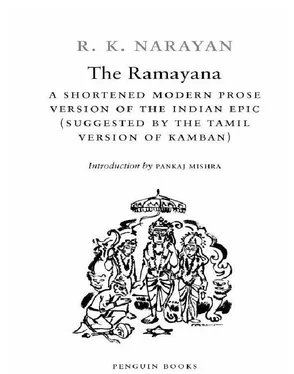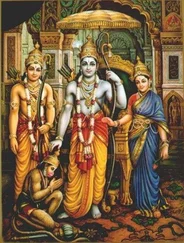Махариши Вальмики - The Ramayana
Здесь есть возможность читать онлайн «Махариши Вальмики - The Ramayana» весь текст электронной книги совершенно бесплатно (целиком полную версию без сокращений). В некоторых случаях можно слушать аудио, скачать через торрент в формате fb2 и присутствует краткое содержание. Жанр: Старинная литература, на английском языке. Описание произведения, (предисловие) а так же отзывы посетителей доступны на портале библиотеки ЛибКат.
- Название:The Ramayana
- Автор:
- Жанр:
- Год:неизвестен
- ISBN:нет данных
- Рейтинг книги:3 / 5. Голосов: 1
-
Избранное:Добавить в избранное
- Отзывы:
-
Ваша оценка:
- 60
- 1
- 2
- 3
- 4
- 5
The Ramayana: краткое содержание, описание и аннотация
Предлагаем к чтению аннотацию, описание, краткое содержание или предисловие (зависит от того, что написал сам автор книги «The Ramayana»). Если вы не нашли необходимую информацию о книге — напишите в комментариях, мы постараемся отыскать её.
The Ramayana — читать онлайн бесплатно полную книгу (весь текст) целиком
Ниже представлен текст книги, разбитый по страницам. Система сохранения места последней прочитанной страницы, позволяет с удобством читать онлайн бесплатно книгу «The Ramayana», без необходимости каждый раз заново искать на чём Вы остановились. Поставьте закладку, и сможете в любой момент перейти на страницу, на которой закончили чтение.
Интервал:
Закладка:
There was no response from Sugreeva. As he gave no sign of comprehending his words, Angada left, went in search of Hanuman, consulted him, and took him along to meet his mother, Tara. He explained to his mother what had happened and appealed to her for guidance. She lost her temper and cried, “You have all indulged in wrong acts without thinking of morality or the consequences. You gain your ends and then forget your responsibilities. You do not possess gratitude. I have dinned into you again and again that the time has come to help Rama; but it seemed as if I were talking to a stone wall. Now you must suffer the consequences of your indifference. You do not realize how Rama is bearing up and how hard it must be for him to remain alive at all. You are all lost in pleasures. You are all selfish and ungrateful. You are prosperous, with no thought for others. You now ask what you should do. You will all perish if you plan to wage a war on Rama and Lakshmana. What is there for me to advise you?”
When she said this, the populace of Kiskinda shut and bolted the city gates and barricaded them with rocks and tree-trunks. Lakshmana watched them, both irritated and amused, and then, with a push and a kick, shattered the blockade and flung the gates open. Great confusion ensued; the monkey populace fled into the neighbouring forests, deserting the city. Lakshmana stepped majestically into the city and looked about. Angada and all the others who stood surrounding Tara, observing him from a distance, asked themselves anxiously, “What shall we do now?”
At this moment, Hanuman counselled Tara, “Please move onto the threshold of the palace with your attendants. Lakshmana will not go past you. Otherwise, I dread to think what might happen if he rushes into the palace.”
“All of you now leave,” Tara said, “and remain out of sight. I will go and face him.”
By the time Lakshmana had traversed the royal path and reached the palace, he heard the jingle of anklets and bracelets, looked up, and discovered an army of women approaching him with determination. Before he could decide whether he should retreat, he found himself encircled; he felt confused and embarrassed. He bowed his head, unable to face anyone, and stood with downcast eyes wondering what to do.
Tara addressed him with all courtesy. “We are honoured and happy at your visit. But the manner of your coming has frightened us. Until we know what you have in mind, we will feel uneasy. Is there anything you wish to tell us?” she asked sweetly.
Lakshmana looked up, and at the first glimpse of Tara’s face felt a sharp remembrance of his mother Sumithra and his stepmother Kausalya. Uncontrollably, his eyes filled with tears. For a moment he was assailed with homesickness. He overcame it and said, “I am sent by my brother to find out why Sugreeva has held himself back, having promised to bring an army for our help.”
Tara replied, “Don’t let your anger turn on Sugreeva. Great ones should forgive the lapses of small men. Anyway, Sugreeva has not forgotten. He has sent messages to all his associates, far and wide, in order to mobilize an army, and he is awaiting the return of the messengers, which is the only cause of delay. Please bear with us. We know that Rama’s single arrow is enough to vanquish all enemies, and our help could only be nominal.”
On hearing these words, Lakshmana looked relieved; noticing the signs of good temper, Hanuman approached him cautiously, and Lakshmana asked him, “Did you, too, forget your promise?”
Hanuman explained, “My mind is always fixed on Rama and there can be no forgetfulness.” He spoke with such humility and sincerity that Lakshmana’s anger finally left him. He now explained, “Rama’s suffering is deep. He needs Sugreeva’s help at this stage; and fears that the longer he delays, the stronger the evil-doers may grow.” Hanuman said, “Please step into the palace and give Sugreeva a chance to receive you, sir. When you stand here refusing to enter, it gives a chance for our enemies to gossip and talk ill of us. Please forget the past and come in.”
Accepting the invitation, Lakshmana followed him into the palace, and was received by Angada, who immediately went in to announce his arrival to Sugreeva. Meanwhile, Tara withdrew with her companions. Angada announced to Sugreeva that Lakshmana was there, and explained in what temper he had arrived and how the gates of the city fell at his touch. Sugreeva listened in surprise and demanded to be told why no one had informed him of Lakshmana’s arrival in proper time. Angada replied gracefully, avoiding any direct charge, “I came in several times and spoke, but perhaps you were asleep when I thought you were awake.”
“You are very considerate to explain it this way,” Sugreeva said, “but I was drunk, and that made me forget my responsibilities and promises. Wine saps away one’s energy, senses, judgement, and memory; and promises are lost sight-of; one loses even the distinction between one’s wife and mother. We are already born into a world of Maya, born in a state of complete self-delusion; we add to this state further illusions that wine creates. No salvation for us. We turn a deaf ear to the advice of wise men and the lessons they point out, and instead just skim out the dirt and insects swimming in the fermented froth, quaff the drink and sink into oblivion. How can I face Lakshmana now?” He brooded for a little while and then declared, “I hereby vow in the name of the most sacred Rama that I will never drink any intoxicant again.”
After this resolution, he felt braced up. “I will now receive Lakshmana. Meanwhile let all honours be properly presented to him and let there be public celebrations in his honour.” Angada busied himself to set the wheels in motion; by the time Sugreeva with his entourage sallied forth to meet Lakshmana, the atmosphere had changed into one of festivity, with the public participating fully in the reception. Music, chantings, incense, and flowers were everywhere and Sugreeva looked majestic.
At the first sight of Sugreeva, Lakshmana’s anger revived for a second, but he suppressed it resolutely, clasped Sugreeva’s hand, and entered the palace hall. Sugreeva pointed to a golden seat and invited Lakshmana to occupy it. Lakshmana merely said, “Rama sits on the bare ground; I don’t need anything more than that.” So saying he sat on the bare floor, an act which saddened Sugreeva and the others. Sugreeva next suggested, “Will you have a bath and partake of our repast?” Once again Lakshmana said, “Rama lives on roots and greens; so do I. Every minute I delay here, he will be going without food. Immediately start a search for Sita and that will be equal to giving me a holy bath in Ganga and offering me a dinner of ambrosia.”
Sugreeva replied in great sorrow, “When Rama is suffering such privations, only a monkey like me can be lost in physical enjoyment. Forgive me.” He turned next to Hanuman and said, “Our messengers have not arrived. When they return with the armies, bring them to Rama’s ashram. Stay here until then. I will now go.” He gathered his followers and proceeded to meet Rama, marching on in solemn silence, his mind full of guilt. But the moment he came face to face with Rama at his mountain retreat, Rama welcomed him with open arms, patted his back, and said, “I hope you and your subjects are happy and flourishing.”
Sugreeva replied, “For one who has received your grace, the achievements of kingship seem trivial and light.” He felt unable to stop his speech and became passionately self-critical: “I have failed in my duty, in my promise, lost myself in pleasures. I have betrayed the limits of the monkey mind. I do not have the right to expect your forgiveness.”
“The rainy season was unexpectedly prolonged,” Rama said, “and I knew that you must have been waiting for its close. Now your speech indicates your determination to help, which makes me happy. I do not doubt your devotion, but you must not belittle yourself so much. . . . Where is Hanuman?”
Читать дальшеИнтервал:
Закладка:
Похожие книги на «The Ramayana»
Представляем Вашему вниманию похожие книги на «The Ramayana» списком для выбора. Мы отобрали схожую по названию и смыслу литературу в надежде предоставить читателям больше вариантов отыскать новые, интересные, ещё непрочитанные произведения.
Обсуждение, отзывы о книге «The Ramayana» и просто собственные мнения читателей. Оставьте ваши комментарии, напишите, что Вы думаете о произведении, его смысле или главных героях. Укажите что конкретно понравилось, а что нет, и почему Вы так считаете.












